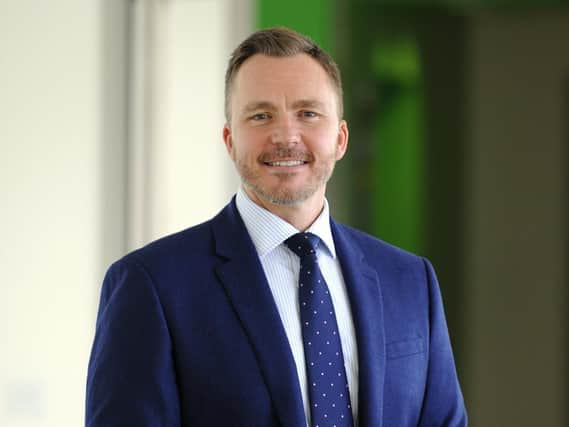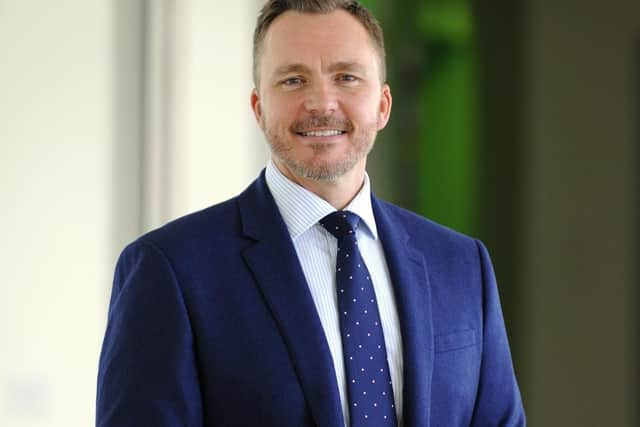QA inspection finds staff have hope for future as boss vows to make further improvements


Health watchdog the Care Quality Commission (CQC) visited the Cosham site in April and undertook a review of nine different departments, its first inspection of this kind in three years.
They found staff had hope for the future of the hospital who's leadership team was tackling the challenges with compassion and energy.


Advertisement
Hide AdAdvertisement
Hide AdPublished today the report found while areas of urgent and emergency care and surgery had got better, some aspects of other services like medical care and maternity had got worse.
The other five departments looked at were critical care, services for children and young people, end of life care, outpatients and diagnostic imaging.
Each department was given an overall rating of either outstanding, good, requires improvement or inadequate along with five further in-depth ratings to say if they are safe, effective, well-led, caring and responsive.


Critical care was the only department given an overall rating of outstanding while services for children and young people was rated outstanding for being caring.
Advertisement
Hide AdAdvertisement
Hide AdMeanwhile, the inspectors found the responsive section of urgent and emergency services was inadequate while the overall maternity rating went from good to requires improvement in the three years.
But Mark Cubbon, chief executive of Portsmouth Hospitals NHS Trust which runs QA, said there are positives to be taken from the CQC report.
'˜It is useful to get feedback from the CQC and see if what they find is consistent with what we are seeing,' he says.
'˜It is also good to have an independent assessment on the progress we have made year-on-year.
Advertisement
Hide AdAdvertisement
Hide Ad'˜I don't think the inspectors found anything that was a surprise to us.
'˜The areas they found that need improving are the same that we have faced significant challenges with over the years.
'˜They cannot be changed overnight but are continuing our work to improve them.
'˜In regards to our emergency services, I was encouraged the inspectors noted and saw for themselves the improvements we have made.'
Advertisement
Hide AdAdvertisement
Hide AdLast year, the urgent and emergency care was inspected following concerns for patient safety. A damning report by the CQC found a number of failings, saying patients were being put at risk.
However, in their latest report it said: '˜At this inspection we saw the trust had made some improvements to improve the safety of the service and therefore the rating had improved from inadequate previously to requires improvement.'
Other positives the CQC found during the inspection were:Â
- Exceptional care in both children and young people's services and critical care with staff going '˜above and beyond'.
- Many of the services taking into account people's individual needs.
Advertisement
Hide AdAdvertisement
Hide Ad- Managers in critical care, children and young people's services and end of life care promoting a positive culture.
- Staff commented the new trust leadership team were visible.
- Many of the services were available seven days a week when patients needed them.
Mr Cubbon said they will be working with the maternity department as it was the only one of the nine that saw all five criteria given a worse rating compared to 2015. It was rated good for being caring but requires improvement for the other four areas.
Advertisement
Hide AdAdvertisement
Hide AdThe report said: '˜Maternity had been rated good overall in our 2015 inspection. However during this inspection all of the domains had declined.
'˜There was not a strong culture of multidisciplinary working amongst the different staff groups providing maternity care and women could not always give birth in the place of their choosing.'
However it did say the staff '˜cared for women with compassion' and '˜provided emotional support to women to minimise their distress'.
Mr Cubbon adds: '˜We will be working with maternity to make sure that the feedback from the CQC can be used to build further improvements in the services.
Advertisement
Hide AdAdvertisement
Hide Ad'˜It is a very busy service and an area we are very keen to make improvements.'
The report found the following concerns across the site:Â
- While some services were planned to meet people's need and had good leadership this was not consistent.
- Not all services provided care and treatment to patients which achieved the best outcomes.
- The emergency department was frequently crowded and staff did not always provide patients with compassionate or respectful care.
Advertisement
Hide AdAdvertisement
Hide Ad- Patients and their carers were not always involved in decisions about their care.
- In the outpatients department there was a poor culture where staff concerns were not always taken seriously.
Mr Cubbon said: '˜Last year, we had six areas that were rated inadequate, now we are down to just one and I think that needs to be recognised.
'˜It shows the improvements we have been able to make. When you look at the nine departments and their different ratings, there are more outstanding and good than requires improvement and inadequate.
Advertisement
Hide AdAdvertisement
Hide Ad'˜Our five-year strategy will help us overcome some of the challenges and concerns in the report.
'˜It will help alleviate some of the big pressures we face.
'˜I am pleased with the changes we have made already but we will continue to improve. It is now the task of our board to drive our improvements at pace and empower and enable our staff to replicate this across all services.'
Professor Ted Baker, CQC's chief inspector of hospitals, said he was was pleased with the report which showed there were signs of change across the organisation.
'˜Staff reported this new approach and 'hope'Â for the future and that there was momentum for change,' he said.
Advertisement
Hide AdAdvertisement
Hide Ad'˜The board understood the importance of this new positive culture that supported and valued staff, and some work had begun to address the immediate cultural issues.
'˜However, further work is required to implement and sustain cultural change across the organisation.Â
'˜The critical care team remain consistent in their approach and reflected the new culture providing an outstanding service and were rated accordingly.
'˜However, it is concerning to note that within both medical and urgent and emergency care staff were not always involving patients and those close to them in decisions about their care and treatment or treating them with compassion.'
Advertisement
Hide AdAdvertisement
Hide AdHe added: '˜As a priority the trust must focus its efforts on those areas where we have identified the need for further improvement. We will continue to monitor the service closely and return in the future to check on the trust's progress.'
